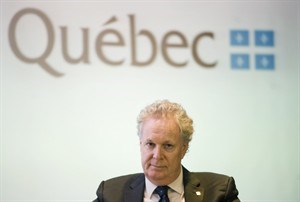
Quebec Premier Jean Charest attends a meeting at the International Economic Forum of the Americas in Montreal, Monday, June 11, 2012. THE CANADIAN PRESS/Graham Hughes
June 11, 2012 - 11:38 AM
MONTREAL - Europe faces severe challenges but is taking the right steps by solidifying the banking system of its weakest members, an international economic conference was told on Monday.
Michel Barnier, European commissioner responsible for internal market and services, told an international economic forum in Montreal, he didn't think Europe is at "one minute to midnight."
"I think Europe is making the right decisions," Barnier said in an opening speech to the 18th annual International Economic Forum of the Americas.
The big challenge flowing out of the 2008 financial crisis has been to ensure that financial institutions are solid in order to serve the real economy, he said.
In Europe, regulators are working to ensure that its 8,300 banks was well capitalized and meet the latest standards, Barnier added.
Haruhiko Kuroda, president of the Asian Development Bank said further deterioration in Europe could drag the world economy back into recession.
"Before it is too late, European leaders should act urgently and decisively," he added.
He called Spain's recent decision to recapitalize its banking sector by borrowing money a significant step forward and could pave the way toward a banking union or fiscal union.
Spain became the fourth European country to seek a bailout, receiving up to $125 billion for its banks in a deal announced on the weekend following help provided for Greece, Ireland and Portugal.
Asia isn't immune to a full crisis in Europe, but strong growth in the developing Asian region is imperative for its own prosperity and also to help the global economy, Kuroda said.
Political, economic and regulatory officials from around the world are meeting at the four-day conference amid the financial crisis in Europe and concerns about economic growth around the world.
Riot police also kept a watchful eye on protesters while security officers blocked the entrance at the downtown Montreal hotel hosting the conference. The city has been gripped by months of demonstrations since the Quebec government announced an increase in post-secondary tuition fees.
Among the speakers expected at the conference are Prime Minister Stephen Harper, Quebec Premier Jean Charest, Bank of Canada governor Mark Carney and his counterpart from France.
Presidents of the U.S. and Canadian chambers of commerce will speak Tuesday, followed on Wednesday by former U.S. Federal Reserve chairman Alan Greenspan.
Mark Zandi, chief economist Moody's Analytics, said European unemployment will rise this year reflecting the region's slowing economy, but he was optimistic that the global economy will perform better next year.
"I think 2014 and 2015 should be very good years," he said.
Zandi said he's most optimistic about North America beyond 2012.
"We've got some issues to nail down but by this time next year I do expect growth to pick up quite significantly and we will see growth that's above potential," he told delegates.
The economist predicts that U.S. unemployment, which now is above eight per cent, will improve to 5.5 to six per cent by the end of 2015 or early 2016, no matter who is elected president in November.
The U.S. is facing a fiscal cliff, with taxes slated to rise Jan. 1 and spending to be cut unless a political deal is reached.
Zandi said he's optimistic that a political deal will be reached to develop a "credible path" to reduce deficits in the future that avoid severe austerity.
Meanwhile, he said it was imperative to relax fiscal austerity in hard pressed European economies.
"There is a fiscal speed limit and we're over it in some of these countries and we need to have a more balanced fiscal austerity path," he said.
"Everyone agrees that fiscal austerity is needed. It's just the path over which that has to occur — we're trying to do this too quickly."
The first step for Europeans is to put their banking system on a solid footing.
It must also keep Greece as a member of the eurozone. If Greece left it would be catastrophic for the country's ability to develop for a generation or two and pose serious contagion effects for Europe, he added.
News from © The Canadian Press, 2012